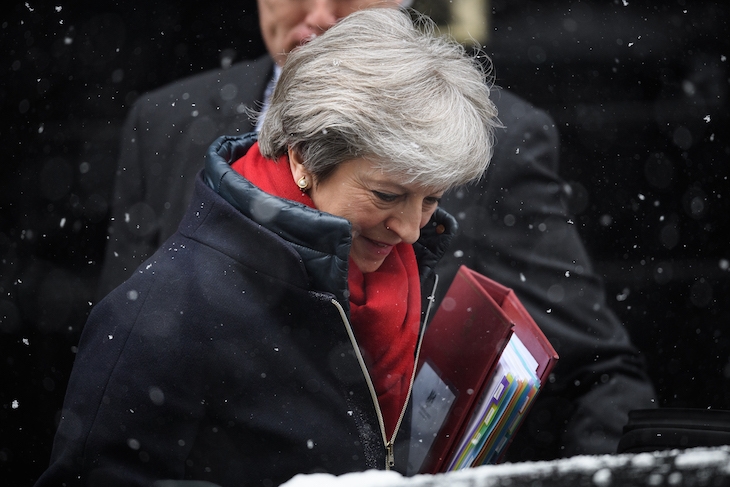For every action, there is an equal and opposite reaction. Every time Conservative Leavers speak up demanding a clean break with Brussels, those in the party who want a soft Brexit feel obliged to push back.
The latest row has been provoked by a letter from the European Research Group — the most powerful Brexiteer bloc in the party. The letter urged Theresa May to deliver ‘full regulatory autonomy’ for the UK. It was taken by many on the soft Brexit wing of the party as a threat to pull support for her if she deviated from this objective. After all, it was signed by 62 MPs — more than it would take to call a vote of confidence in her leadership. So the soft Brexiteers retaliated. They suggested they’d vote for an amendment requiring the government to form a customs union with the EU after Brexit.
Mrs May’s problem is that both sides suspect that her policy is essentially to be equidistant between them. Both sides then have an incentive to adopt hardline positions in the hope of dragging her their way. Among former Remainers, there is also a sense that if they had been as difficult and combative as the Eurosceptics over the years, Britain wouldn’t actually be leaving the EU, as David Cameron would never have committed to a referendum.
No. 10 believes it will need the votes of pretty much every Tory MP to pass a Brexit deal. Jeremy Corbyn’s tactical positioning on the customs union has reinforced the sense that Labour will ultimately take any opportunity to defeat the government. Thus every group of Tory MPs believes it is worth trying to bend the government to their will.
In this exercise, the European Research Group has certain structural advantages. It is closer to the opinions of the Tory party’s members than those MPs who are seeking a soft Brexit. Those pushing the ERG line don’t, as a rule, have to fear the wrath of their local associations. It is also far easier for them to get what they want. As soon as the government invoked Article 50, it put this country on a course to leaving the EU, with or without a deal. If the withdrawal agreement is voted down in parliament, the UK will still leave, just without a deal. By contrast, the soft Brexiteers have two challenges. First, treaty-making is always a crown prerogative so it will be hard, if not impossible, for parliament to micro-manage negotiations with the EU. Secondly, a soft Brexit will require the co-operation of the EU — and parliament, while sovereign here, is not sovereign anywhere else. The EU might be prepared to offer the UK a customs union on a Turkey-style basis, which would mean that Brussels could offer up access to the UK market on Britain’s behalf. But, pace Corbyn, it would be unlikely to give the UK anything more than the right to be consulted on future trade deals. After all, one of the EU’s key objectives in these talks is to show that there isn’t a deal that is better than membership.
The ERG’s final advantage is that it is seen as being more prepared to bring the temple crashing down. MPs such as Nicky Morgan are viewed as being too sensible, and having too bright a future in the party, to risk a general election with the Tories in disarray, when the alternative is the most left-wing prime minister in recent memory.
So which way will May turn in the end? Well, the Chequers meeting of the Brexit inner cabinet offered some substantial clues. May has chosen, at least, to open with a position that has alignment with EU rules as voluntary for the UK and allows divergence over time. Now, the EU is unlikely to accept this: Donald Tusk has already attacked the proposals as being based on ‘pure illusion’ before they have even been formally presented.
But once May has set down her opening position it will be more difficult than many appreciate for her to move away from it. There is bound to be some give and take in the negotiations; indeed, one of the reasons that the Brexiteers in the inner cabinet were so concerned ahead of the Chequers meeting is that they knew there would be concessions once the talks got under way. It will be hard, however, for May to abandon the principles that underpin her opening offer.
One of the most complicated parts of the Brexit negotiation will be the Irish border. The EU is determined to get the legal position on that hammered down in the withdrawal agreement, which is difficult for the UK government as it will set out in the most detail the so-called ‘Option C’, which effectively requires Northern Ireland to remain part of the customs union and significant chunks of the single market. If this were to happen, it would effectively create an internal border within the UK which would be unacceptable to the DUP and many on the Tory benches.
Many in government, including several members of the Brexit inner cabinet, had expected the Northern Ireland issue to end up directing the UK’s overall approach to Brexit. But I understand that the sense of the Chequers meeting was that the UK would try to negotiate its deal with the EU and then address what else was needed to make the Irish border work as smoothly as possible.
Europe has done for the last three Tory prime ministers. It will be a remarkable achievement if Mrs May can avoid this fate and keep her party together through the withdrawal negotiations.
On The Spectator Podcast, James Forsyth and Katy Balls ask whether Theresa May will ever find peace in her party on Europe:







Comments